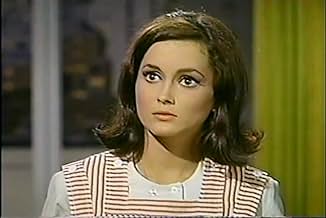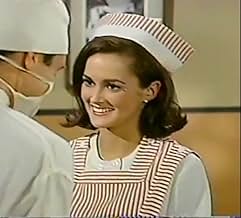A junior executive convinces his female friend to pretend to be his wife so he can move ahead in his company.A junior executive convinces his female friend to pretend to be his wife so he can move ahead in his company.A junior executive convinces his female friend to pretend to be his wife so he can move ahead in his company.
Browse episodes
Featured reviews
"Occasional Wife" ran for one season on NBC from September 13, 1966 until May 9, 1967. The series was one of the first to forego the use of a laugh track. Its narration is by legendary sportscaster Vin Scully. "Occasional Wife" got off to a good start, tying at 18 in the Nielsen ratings with "The Man from U.N.C.L.E.". It began facing tougher competition from rival networks, dropping to 64 and was cancelled after 30 episodes.
The show centers around Peter Christopher (Michael Callan), a happy bachelor who is pressured to find a wife to please his family and to advance his career. His boss Max Brahms (Jack Collins) of Brahms Baby Food Company is a firm believer in family men. Peter enlists the help of a young hat check girl Greta Patterson (Patricia Harty), in exchange for paying for her art lessons and setting her up with an apartment two floors above his, to play the role of his wife whenever needed. The series rides this plot with the complications of hiding the fact they aren't married from their colleagues, friends and family.
Reflecting upon the series, after watching each episode, "Occasional Wife" is a rather farcical sitcom featuring an outlandish premise. Early on, I found many episodes struggled to maintain flow with plots feeling somewhat strained. As such, I think the series would have had much more success as a feature film expanding upon the pilot with elements of other episodes. The plot of hiding the "occasional wife" routine became overplayed in my eyes. As the series progressed, I feel the best episodes are those that doesn't depend on this premise.
Michael Callan and Patricia Harty developed a very comfortable chemistry (they married months after the series ended). However, their comedy style was more of that of a straight man, forcing the comedy to come from interactions with others. I like the casting of Jack Collins as Peter's pushy, family-first boss Mr. Brahms.
The series was at its best with the comedy of talented guest stars: John Astin in "I Do, We Don't", Dick Wilson in "One Plus One Equals Too Many", Don Penny in "My Occasional Brother's Keeper", etc.). Stuart Margolin's meek Bernie could engage the viewer and provide comedy. The series would have benefited greatly if he was a regular in some capacity. It was also fun to watch Jack Riley as Peter's snake-in-the-grass office rival, years before he became a treasured deadpan scene stealer in "The Bob Newhart Show".
Among subpar offerings, there are some good episodes in the series.
The show centers around Peter Christopher (Michael Callan), a happy bachelor who is pressured to find a wife to please his family and to advance his career. His boss Max Brahms (Jack Collins) of Brahms Baby Food Company is a firm believer in family men. Peter enlists the help of a young hat check girl Greta Patterson (Patricia Harty), in exchange for paying for her art lessons and setting her up with an apartment two floors above his, to play the role of his wife whenever needed. The series rides this plot with the complications of hiding the fact they aren't married from their colleagues, friends and family.
Reflecting upon the series, after watching each episode, "Occasional Wife" is a rather farcical sitcom featuring an outlandish premise. Early on, I found many episodes struggled to maintain flow with plots feeling somewhat strained. As such, I think the series would have had much more success as a feature film expanding upon the pilot with elements of other episodes. The plot of hiding the "occasional wife" routine became overplayed in my eyes. As the series progressed, I feel the best episodes are those that doesn't depend on this premise.
Michael Callan and Patricia Harty developed a very comfortable chemistry (they married months after the series ended). However, their comedy style was more of that of a straight man, forcing the comedy to come from interactions with others. I like the casting of Jack Collins as Peter's pushy, family-first boss Mr. Brahms.
The series was at its best with the comedy of talented guest stars: John Astin in "I Do, We Don't", Dick Wilson in "One Plus One Equals Too Many", Don Penny in "My Occasional Brother's Keeper", etc.). Stuart Margolin's meek Bernie could engage the viewer and provide comedy. The series would have benefited greatly if he was a regular in some capacity. It was also fun to watch Jack Riley as Peter's snake-in-the-grass office rival, years before he became a treasured deadpan scene stealer in "The Bob Newhart Show".
Among subpar offerings, there are some good episodes in the series.
Peter Christopher was the lead man . He played a bachelor (Michael) who was determined to never marry in spite of his bosses family values Peters boss baby food mogul Max Brahms was controlling and Michael had to ask a beautiful hat check clerk (Greta Patterson) to pose as his wife and the charade became out of control and the antics off the wall. Yet they continued to fool Michaels boss.
What Michael did not realize is that his neighbor (Bryan Obyrne) was a peeping Tom because he watched the comings and goings from the Sixth floor where Michael lived to the eighth floor where Greta lived.
There may have been a few sparks of love but cupids arrow did not hit its target in the first season and cupid had no other seasons to score . So the possibility of them marrying was left hanging
What Michael did not realize is that his neighbor (Bryan Obyrne) was a peeping Tom because he watched the comings and goings from the Sixth floor where Michael lived to the eighth floor where Greta lived.
There may have been a few sparks of love but cupids arrow did not hit its target in the first season and cupid had no other seasons to score . So the possibility of them marrying was left hanging
I too loved this show as a teenager. It didn't last long but I remember it well. I thought I might be the only one who did until I looked it up and read the other reviews. It was a funny show with what I thought was a lot of potential for hilarious episodes. There was a lot of climbing in and out of windows and a lot of close calls when they were almost caught in separate apartments or with other people. It seemed to fit with the popular situation comedies of the time (Bewitched, That Girl, I Dream of Jeannie). I've always wondered why it didn't catch on. I wonder what was on the other networks at the same time. Would that explain why it was overlooked? I don't know if I would feel the same if I saw the episodes today but I would love to give it a try.
I was 11 when O.W. premiered in 1966 and I really enjoyed this very amusing sitcom. I too was sad to see this series end only after one year. I remember reading that NBC was on the fence about canceling O.W., but they decided to go ahead and cancel this charming show. In 1992 Comedy central aired the reruns of O.W. and I was thrilled. I taped a handful of them and I still watch them occasional:) I hope that this show is released on DVD someday. Many short-lived shows have been released on DVD recently...The Monkees; Good Morning World; Ned & Stacy; Lotsa Luck; Gidget; well the list goes on and on...Please release O.W. and include interviews with Michael Callan, Patricia Harty and Bryon O'Byne. There is an audience out there who would love to get their hands on this series!
This series is a complete, total and utter non-sequitur. Visually it's bright colors and stark scenery (this is a 1960's TV budget) are firmly planted in 1959. The story line superficially is pure Doris Day/Rock Hudson. The execution is more Larry David/Monty Python. This situation comedy is so surreal that it could never last more than a season in a world where HBO/Showtime would not exist for 20 years. From the bongos in the opening title music to the avant-garde narration you know you are in a parallel universe. The plots are totally stupid...hello, Jerry Sienfeld! The resolutions make no sense and the stories turn on a dime...Why?...Why not! As the playboy who hires a hat check girl (this is a time when men wore hats) to pose as his wife so he can get a job promotion (the president of a baby food company does not give promotions to unmarried men), Michael Callan makes an excellent self-centered playboy...and he sleeps with women he is not married to. Is this 1966 TV? Patricia Harty proves herself to be an incredible comedian. Cute, perky, smart and thoroughly self-absorbed; she is an utter gem (Coutney Cox, Jennifer Aniston and Debra Messing can't hold a candle to her talent). To add to the sideshow, the third billed character who appears in the opening manages to not say a word in the entire series. The guest stars are a "Who's Who" of 60's TV including Sally Field and John Astin. If you are a devoted fan of "The Beverly Hillbillies" or "The Andy Griffith Show", please move on. For the rest of us, sit back and enjoy.
Did you know
- ConnectionsReferenced in Mystery Science Theater 3000: Jungle Goddess (1990)
- How many seasons does Occasional Wife have?Powered by Alexa
Details
- Release date
- Country of origin
- Language
- Also known as
- Un soltero casado
- Production company
- See more company credits at IMDbPro
Contribute to this page
Suggest an edit or add missing content



































